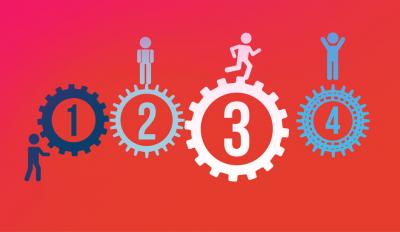Why RLC's Hitendra Chaturvedi Says No to Yes Men
- BY Sonal Khetarpal
 In Operations
In Operations 11171
11171 0
0

Much like he enjoys revving up his Harley Davidson, Hitendra Chaturvedi enjoys accelerating the growth of Reverse Logistics Company (RLC), a company selling seconds products through their brand Green Dust. Running a business seemed an unlikely pit stop for somebody like Chaturvedi, who has worked at corporate giants such as Microsoft and Ernst & Young. Yet, it was Chaturvedi’s three year stint at the Texas-based reverse logistics company, Newgistics that changed the course of his career and led him to found RLC in 2008. Today, he’s happy with just five hours of sleep, and is using best practices from his previous companies to outfit RLC’s culture. A passionate and certified pilot and painter, Chaturvedi is now most focused on his new goal—of evolving from a manager to a leader.
My day actually never ends. With e-mails synced to my phone, I can work anywhere at any hour. My car, my home is my office. Yet, I wouldn’t say I am a workaholic. Running your own company is like being on a vacation; you just never get tired. So, I sleep around 2am and wake up by 6.30am. After doing puja and downing my usual breakfast of cereal and fruits, I leave for office. I ride my Harley-Davidson to work, and by 7.30am I am in office. For the first half an hour at work, I don’t switch on my computer. I use the solitude to collect my thoughts, and make a note of whatever comes to my mind in my diary. By 9am, I have already replied to all my mails, made presentations, seen various reports from the day before and given feedback.
I don’t have a title on my card. If people ask, I’m the Chief Troublemaker.”
- Hitendra Chaturvedi
Beyond 9am, I don’t have a typical working day. I am on the road a lot. I travel 20 days a month to meet clients, investors or to visit our different offices. Wherever I am, I spend 60-70 per cent of my time managing the 500 people we have in our 15 offices in India. That people are the greatest asset of an organisation is a gyaan that a lot of successful entrepreneurs talk about. To be honest, I used to be very cynical about such corny statements. But, over the last five years, I’ve learnt that it’s actually very true. When you are running a company, you can predict most variables such as demand, supply, market reaction, but you can never really know how people react to different situations. A company is much like the popular television show Big Boss. People from different backgrounds and distinct personalities are brought together. The CEO or the founder is much like the Big Boss voice in the background which gives them tasks, guides them and resolves their frictions.
GreenDust that recently got actor Vinay Pathak on board for its advertisements, claims to be among the top reverse supply chain company in India today with global ambitions.
To make everyone work together and be joint to a purpose, I ensure each of my employee understands why Green Dust exists. There are two main reasons that excite me—one is that we are contributing to being green and sustainable. India has a return rate of 4 per cent, that is, products worth $14 billion get returned every year and they sit idle at the original equipment manufacturers’ (OEM) warehouse. RLC takes those defective, returned or unsold products from OEMs, repairs them, provides a year’s warranty, and sells those factory seconds at a lesser price, thereby saving them from going to the scrap heap. By making them usable, we are helping the environment. That, to me, is a cause worth battling for. What also motivates me is making aspirations come within the reach of the aam aadmi who is always stretching his rupee and might not buy a product at its market price, but can afford it at 25 per cent less. These are essentially the two reasons why RLC exists and I am trying to incorporate this in each employee. I have also got posters with the company’s vision, mission and values pasted all over our offices.
Beyond company vision, a good manager must understand what drives each person.
For some it is money, for others it can be recognition, competition or job security. Aligning their motivation with the company’s goals ensures everyone grows together with the company. This has to start right from the time of hiring them. I personally interview each and every employee of this company to be doubly sure that we hire the right people. I prefer to get those people on board who complement my skill set. Getting people exactly like you is the worst mistake an entrepreneur can make. It’s important for entrepreneurs to know what they don’t know and I hire the best from that domain. I do not want my company to be a congregation of yes men, people who nod their heads at everything I say. I want them to challenge me in the board room. I admire people who create their own identity, rather than follow others. I constantly engage with my staff and encourage them to communicate their ideas on projects and work processes. I do not sit in the ivory tower and give directions. I ensure I know exactly what is happening on the ground. If I don’t know something, someone will take advantage of that and it might lead to more office politics. I am totally against that. Often, I do surprise visits to our different offices to find out the real story.
My company is not a congregation of yes men. I like people to challenge me.
Being a good manager is mostly about listening. In fact, listening is my most effective work habit. Of course, the challenge is in listening to everyone, and yet to be neutral. I try not to get swayed by anyone’s personal opinion or prejudice against a colleague. But it gets difficult at times. It is then that I remind myself that it is not only an employee but also his or her family that is fed with the cheques I sign. I cannot let them get affected by making rash decisions because of an individual grudge. To be truly objective, especially when it comes to personnel decisions, I always stick to the facts. From the first day we began the company, we introduced an IT-based performance management system. Every quarter, each employee self-assesses and is assessed by his or her reporting manager on the basis of certain key performance indicators. I normalise all the reports in a bell curve on the basis of top-10 per cent, mid-80 per cent and last-10 per cent employees. The top 10 per cent get all the promotions, raises and incentives. That way, all employees know their position in the company and can plan their career, accordingly. This allows for complete transparency and clarity in the appraisal process. I’ve picked this approach from my stints at Microsoft and AT Kearney. They had structured their performance appraisal just like this.
I’ve been fortunate to work in some good companies. So, I am always trying to bring in the best practices from my previous work places into my company’s culture. I want RLC to be one of the best places to work in. It’s my aim that people should enjoy their work. For that, a light-hearted, healthy atmosphere is essential. I am proud our attrition rate is less than three per cent. Making people feel acknowledged is hugely necessary. I make it an effort to talk to my employees on a personal level, even if it is one sentence about the well being of their family, so that they know I notice and care. On people’s birthdays, marriage anniversaries or other special occasions, an e-mail is blasted out to the whole company. I message each of them personally. When we have office parties, festivals or other events, we plaster the whole office with photos from the event. I got this idea from Southwest Airlines in Dallas, USA when I did a management consulting project for them.
[image_library_tag c883ac3a-2812-41df-953a-690ba3b0b5c4 380X400 alt="tanding ut ot having a brand like icrosoft or rnst and oung to back you can be humbling haturvedi ensures that people from his senior management spend at least half a day every month staffing the call centre so that theyre grounded to reality" width="400" border="0" ] Standing Out: Not having a brand like Microsoft or Ernst and Young to back you can be humbling. Chaturvedi ensures that people from his senior management spend at least half a day every month staffing the call centre so that they're grounded to reality.
I have realised that celebrations, experiences and emotions is what we ultimately remember. Milestones just keep on shifting forward but it’s only when you start enjoying these moments of happiness that the destination becomes really worth it. I remember how I would travel in an auto and live in budget hotels in the initial years of starting the company. Working for big names like Ernst & Young, AT Kearney and Microsoft, I was used to chauffeur-driven cars and five-star hotels. However, as a founder of a growing company, I gave it up. It was a different kind of life altogether. The first five years of heading RLC has taught me 90 times more than my 17 years of work experience put together. I have also realised that when you are working for such established companies as Microsoft, you tend to become big-headed. It is because you are always acknowledged and treated well. What I didn’t realise then was that it was not me or my designation that appealed to people, it was the Microsoft brand. When I started RLC, I realised people don’t care about me as much. I decided that
It is important that they know what our customers are taking about and what is actually happening on the ground. In Amazon, every Christmas, the entire manment agement team, including the founder, Jeff Bezos is in the warehouses packing boxes to ship to customers. Such practices help to keep the organisational structure flat. I also do not have my designation printed on my business card. When people ask me, I just say, “I’m the Chief Troublemaker”.
In spite of these efforts, the general mindset in India tends to lean towards a lot of hierarchy. As a founder, everyone expects me to have answers for all their questions. Sometimes, it does get lonely battling people’s expectations, and the company’s challenges. I do wish I had a sounding board to discuss my dilemmas. In fact, I believe it’s probably wise to have a co-founder. To beat the stress, I work out at the gym daily, seven days a week. My everyday routine of morning puja and exercise in the evening help me face the problems. I also get inspiration from the books I read. I particularly find this quote from Mark Twain very stimulating, “Twenty years from now you will be more disappointed by the things that you didn’t do than by the ones you did do. So, throw off the bowlines. Sail away from the safe harbor. Catch the trade winds in your sails. Explore. Dream. Discover.” But, the real motivation, I think, I draw from my own personality. I am my own worst critic. I am never satisfied with what I do and that pushes me to do better and better.I





























Add new comment